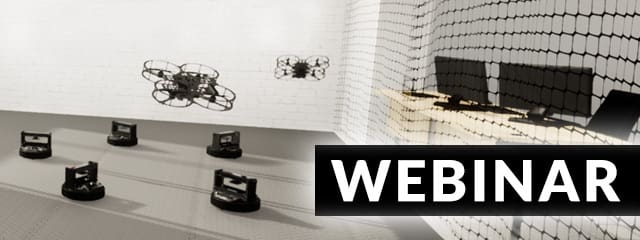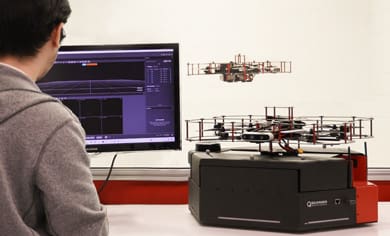
Webinar Details
Wednesday, June 30, 2021
10 AM EDT (UTC/GMT-4)
SHU Engineering’s brand-new Electrical and Computer Engineering (ECE) programs has made major investments in laboratory equipment with hopes of significant curriculum integration. In this webinar, I will share Sacred Heart University Engineering’s experience, from the acquisition of Quanser’s Autonomous Vehicle Research Studio (AVRS), including ground and aerial vehicles, to challenges of installation and generating know-how. I will also describe how we were able to incorporate MATLAB/Simulink into the curriculum using Quanser systems as the main teaching platform. Fast forward, (1) a drone-based capstone project was completed that was published in an international conference, (2) Credly certification programs were created, (3) Blackboard-based learning modules were created for sophomore/junior level engineering courses, (4) a research team was formed working on smart vehicle applications. We are excited to share our rather untraditional path to success integrating a graduate research grade platform into the undergraduate ECE curriculum. Presenter Bio: Dr. Kaya is currently a Professor and the Director of Electrical and Computer Engineering programs (SHU Engineering) under School of Computer Science and Engineering at Sacred Heart University. Before joining to SHU in 2017, Dr. Kaya was an Associate Professor at Central Michigan University’s School of Engineering and Technology between 2010-2017. Dr. Kaya worked as a research scientist at Yale University from 2007 to 2010 at the School of Engineering and Applied Sciences. He has worked in industry as a technology consultant (Brightwell Corp.) and a senior analog circuit designer (Microelectronics, Inc.) for several years. Dr. Kaya has a diverse research background and accomplishments on Electrical, Computer, and Biomedical Engineering. His research primarily focuses on wearable devices to monitor physiology of athletes. He is well known in the field of hydration research. Dr. Kaya also focuses on Internet of Things (IoT) devices, 3D printing technologies, and more recently sports data analytics. In the past few years, Dr. Kaya also conducted research on education technology and teaching pedagogies. He implements active learning strategies in his classrooms and focuses on student-centered learning. All his courses have significant hands-on components with plenty activities to help students link theory with practice.
Presenter Bio: Dr. Kaya is currently a Professor and the Director of Electrical and Computer Engineering programs (SHU Engineering) under School of Computer Science and Engineering at Sacred Heart University. Before joining to SHU in 2017, Dr. Kaya was an Associate Professor at Central Michigan University’s School of Engineering and Technology between 2010-2017. Dr. Kaya worked as a research scientist at Yale University from 2007 to 2010 at the School of Engineering and Applied Sciences. He has worked in industry as a technology consultant (Brightwell Corp.) and a senior analog circuit designer (Microelectronics, Inc.) for several years. Dr. Kaya has a diverse research background and accomplishments on Electrical, Computer, and Biomedical Engineering. His research primarily focuses on wearable devices to monitor physiology of athletes. He is well known in the field of hydration research. Dr. Kaya also focuses on Internet of Things (IoT) devices, 3D printing technologies, and more recently sports data analytics. In the past few years, Dr. Kaya also conducted research on education technology and teaching pedagogies. He implements active learning strategies in his classrooms and focuses on student-centered learning. All his courses have significant hands-on components with plenty activities to help students link theory with practice.
 Presenter Bio: Dr. Kaya is currently a Professor and the Director of Electrical and Computer Engineering programs (SHU Engineering) under School of Computer Science and Engineering at Sacred Heart University. Before joining to SHU in 2017, Dr. Kaya was an Associate Professor at Central Michigan University’s School of Engineering and Technology between 2010-2017. Dr. Kaya worked as a research scientist at Yale University from 2007 to 2010 at the School of Engineering and Applied Sciences. He has worked in industry as a technology consultant (Brightwell Corp.) and a senior analog circuit designer (Microelectronics, Inc.) for several years. Dr. Kaya has a diverse research background and accomplishments on Electrical, Computer, and Biomedical Engineering. His research primarily focuses on wearable devices to monitor physiology of athletes. He is well known in the field of hydration research. Dr. Kaya also focuses on Internet of Things (IoT) devices, 3D printing technologies, and more recently sports data analytics. In the past few years, Dr. Kaya also conducted research on education technology and teaching pedagogies. He implements active learning strategies in his classrooms and focuses on student-centered learning. All his courses have significant hands-on components with plenty activities to help students link theory with practice.
Presenter Bio: Dr. Kaya is currently a Professor and the Director of Electrical and Computer Engineering programs (SHU Engineering) under School of Computer Science and Engineering at Sacred Heart University. Before joining to SHU in 2017, Dr. Kaya was an Associate Professor at Central Michigan University’s School of Engineering and Technology between 2010-2017. Dr. Kaya worked as a research scientist at Yale University from 2007 to 2010 at the School of Engineering and Applied Sciences. He has worked in industry as a technology consultant (Brightwell Corp.) and a senior analog circuit designer (Microelectronics, Inc.) for several years. Dr. Kaya has a diverse research background and accomplishments on Electrical, Computer, and Biomedical Engineering. His research primarily focuses on wearable devices to monitor physiology of athletes. He is well known in the field of hydration research. Dr. Kaya also focuses on Internet of Things (IoT) devices, 3D printing technologies, and more recently sports data analytics. In the past few years, Dr. Kaya also conducted research on education technology and teaching pedagogies. He implements active learning strategies in his classrooms and focuses on student-centered learning. All his courses have significant hands-on components with plenty activities to help students link theory with practice. 

